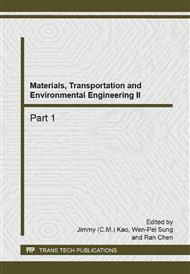[1]
T.D. Braun, H.S. Siegel, N. Beck: A comparison of eleven static heuristics for mapping a class of independent tasks onto heterogeneous distributed computing systems. Journal of Parallel and Distributed Computing Vol. 61(6) (2001), pp.810-837.
DOI: 10.1006/jpdc.2000.1714
Google Scholar
[2]
B. Naderi, M.R. Tavakkoli, M. Khalili: Electromagnetism-like mechanism and simulated annealing algorithms for flowshop scheduling problems minimizing the total weighted tardiness and makespan. Knowledge-Based Systems Vol. 23(2) (2010), pp.77-85.
DOI: 10.1016/j.knosys.2009.06.002
Google Scholar
[3]
E.S.H. Hou, N. Ansari, H. Ren: A genetic algorithm for multiprocessor scheduling. Parallel and Distributed Systems, IEEE Transactions on Vol. 5(2) (1994), pp.113-120.
DOI: 10.1109/71.265940
Google Scholar
[4]
Y. Wen, H. Xu, J. Yang: A heuristic-based hybrid genetic-variable neighborhood search algorithm for task scheduling in heterogeneous multiprocessor system. Information Sciences Vol. 181(3) (2011), pp.567-581.
DOI: 10.1016/j.ins.2010.10.001
Google Scholar
[5]
M.I. Daoud, N. Kharma. A hybrid heuristic–genetic algorithm for task scheduling in heterogeneous processor networks. Journal of Parallel and Distributed Computing Vol. 71(11) (2011), pp.1518-1531.
DOI: 10.1016/j.jpdc.2011.05.005
Google Scholar
[6]
A.S. Wu, S.Y. Jin: An Incremental Genetic Algorithm Approach to Multiprocessor Scheduling. IEEE Transactions on Parallel and Distributed Systems Vol. 15(9) (2004), pp.824-834.
DOI: 10.1109/tpds.2004.38
Google Scholar
[7]
H. Topcuoglu, S. Hariri: Performance effective and Low complexity Task Scheduling for Heterogeneous Computing. IEEE Transactions on Parallel and Distributed Systems Vol. 13(3) (2002), pp.260-274.
DOI: 10.1109/71.993206
Google Scholar
[8]
Z. Bingul: Adaptive genetic algorithms applied to dynamic multi-objective problems. Applied Soft Computing Vol. 7 (2007), pp.791-799.
DOI: 10.1016/j.asoc.2006.03.001
Google Scholar
[9]
J. Carretero, F. Xhafa, A. Abraham: Genetic algorithm based schedulers for grid computing systems. International Journal of Innovative Computing, Information and Control Vol. 3(6) (2007), pp.1-19.
Google Scholar


